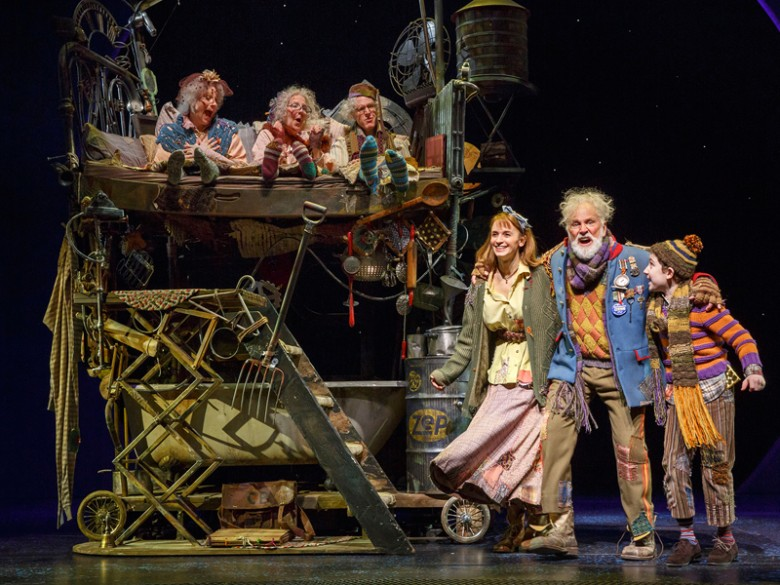Charlie Bucket loves chocolate more than anything, and Willie Wonka holds the keys to that delicious kingdom—or to be more accurate, the five golden tickets to his amazing, secret chocolate factory. What is a poor boy to do who gets only one chocolate bar a year on his birthday? Such is the dilemma faced by eleven-year-old Charlie, played with earnest sweetness and sincere resolve by Henry Boshart, who shares the role with two other boys in Charlie and the Chocolate Factory, the fantasy musical now at Shea’s that is based on the beloved 1964 classic children’s book by Raold Dahl.
While the musical is an updated version, including talk of Twitter and Instagram among other nods to contemporary culture, the bones of the story remain intact in this delightful production that fuses the 20th century story of what happens when children are bad and don’t obey the rules—and when children are good and don’t obey the rules—with 21st Century technology, highlighted by the Projection Design of Jeff Sugg.
Mr. Sugg brings the chocolate factory to life with hundreds of butterflies fluttering around and beautiful greenery acting as an archway above the centerpiece set (by Marc Thompson) of a chocolate waterfall with candy flowers and plants all around. Most impressive is seeing one of the children, the device-obsessed Mike Teavee, inside the workings of a television, racing around the circuits until he pops onto the screen, a tiny little guy that his mother takes out and puts in her purse.
Which brings us to Puppet and Illusion Design by Basil Twist. The little guy in the purse looks very real, flailing his arms around and squeaking. The Oompa-Loompas are terrific. With orange-haired actors' heads on tiny puppet bodies, the effect is very charming and very funny. They light up the stage with their precise movements and high-pitched voices.
We meet Willie Wonka in the opening number with the song Candy Man, a holdover from the 1971 movie. Then we are introduced to Charlie with Willie Wonka! Willie Wonka! As the first act progresses, we meet each child who wins a golden ticket, the obese German boy who loves sausage, Augustus Gloop, the Russian ballerina, Veruca; the “Queen of Pop,” Violette; and the before-mentioned Mike Teavee. The roles are played by adults who are very believable as the spoiled children, obsessed with themselves and their demands.
In Act Two, Willie Wonka takes center stage as he leads the children and their parents on a tour of his factory. Noah Weisberg is excellent in the role of Willie Wonka. His movements are graceful. His humor, acerbic at times, is tempered by his ability to laugh at, well, just about everything and everyone, including himself. He flits about spouting clever dialogue, making sarcastic comments, exhibiting an amoral disinterest in the fate of the children, and singing complicated lyrics with poise and confidence.
The large cast is first-rate. Jessica Cohen stands out as Veruca. She combines her expert ballet dancing with a shrill presence that belies the beauty of her form. Clyde Voce has great timing as Mrs. Green, the purveyor of “antique vegetables.” Daniel Quadrino as Mike Teavee shows off his acrobatic skills, and Madeleine Doherty is very funny as his straight-laced, yet fond-of-the-drink, mother.
Directed by Jack O’Brien, this production of Charlie and the Chocolate Factory keeps the audience engaged from start to finish. If you like dancing squirrels, imaginative sets, convoluted clever dialogue, extravagant special effects, and a story that captures some of the fears and nightmares of childhood, as well as the creative possibilities of imagination, you can see it all at Shea’s through September 29th.

